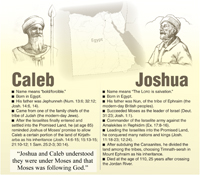As a trumpet blast rang out, the people of Israel stopped short of the Promised Land. After wandering in the desert following their departure from Egypt, they were eager to cross into the new territory.
However, the new terrain was strange. Before all Israelites could enter safely, it first needed to be explored.
God instructed Moses to select one strong man from each of the 12 tribes of Israel—men who possessed leadership ability—to scout the land He intended to give His people. The men chosen were mighty among their tribes—princes who were physically powerful, agile and well-trained. These men would be Israel’s “eyes and ears” as they explored the new land. Skilled in perception, stealth and weaponry, they seemed to be ideal candidates for this special mission.
Moses exhorted the men to be courageous and spy out the land.
The men left, beginning their arduous 40-day adventure to discover the wonders that awaited them in the new country.
What they found was shocking. The land was green and lush, with majestic mountains, vast seas and pristine shores. The terrain was expansive, with all types of vegetation: fruit trees, grapevines, pomegranates and figs (Num. 13:23). The grapes were so large they had to be strung along a staff and carried by two powerful princes!

Source: RCG illustration/Paula Rondeau
However, despite the wondrous beauty and wealth of the land, there were fearsome peoples settled along the mountains and seashores. These inhabitants—the Amalekites, Hittites, Jebusites, Amorites and Canaanites—frightened the scouts. They knew these savage peoples practiced human sacrifice and engaged in tribal warfare. And among them were the legendary children of Anak—giants! After 40 days the scouts returned and reported to Moses what they had seen.
Incredibly, 10 of the 12 princes were terrified by the warring nature of the land’s inhabitants, and brought a negative report to Moses. They insisted the savages there had built towering strongholds—“walled, and very great” (vs. 28)—implying that the fortified cities would crush the Israelites if they dared approach them. The 10 scouts cowardly claimed the Israelites could not prevail against the people in the Promised Land.
The entire congregation of Israel believed the report. Millions of Israelites were willing to take the word of cowards who sought an easy way out.
In the end, only two men, Joshua and Caleb, possessed the leadership qualities needed to stand against these lies and tell the truth (Num. 13:32-33). They boldly declared that Israel was well able to conquer the land! “And Caleb stilled the people before Moses, and said, Let us go up at once, and possess it; for we are well able to overcome it” (vs. 30).
These two powerful leaders faced millions of Israelites who did not want to hear that they should move forward and enter the Promised Land (Num. 14:6-9). Their fellow Israelites demanded their death, not wanting to hear the truth (vs. 10). Ultimately, God punished Israel, allowing that rebellious generation to die in the wilderness, yet permitted their children to enter the Promised Land. God rewarded Joshua and Caleb for their examples as leaders, allowing them to enter also (Num. 14:30).
Just what is a true leader—and what qualities does he or she possess? Why do we need leaders and whom do they lead?
Are you a leader? What can you do to become one?
The Greatest Quality of a Leader
Joshua and Caleb were both outstanding examples of leaders. Defying the opinions of their people, they lived the quote, “True leadership is standing for what is right even if you stand alone.”
The society in which we live isn’t concerned with God’s view of right and wrong. Most teens follow a mob mentality. They feel they must blend in with the crowd, not stand out in one. Anything that sets them apart from their peers is socially devastating and publicly humiliating.
Yet Joshua and Caleb were not afraid to demonstrate that they were different from millions of their own people—even to the point that those same people demanded their death. Regardless of the circumstances, these two men stood their ground, without giving in to the other ten princes. This proved their ability to stand firm for their principles and not buckle under pressure.
In the same vein, you must understand that being in the Church of God sets you apart from your peers. God has given you an incredible opportunity to know His truth and be part of a select group of leaders, those who live their lives as examples that others should follow. Your peers will be watching how you conduct yourself.
Just as Joshua and Caleb demonstrated true leadership by standing on principle and following God’s commands, despite popular opinion, so you must develop the same strength and be an example—despite what others around you might say or do.
Other Qualities of a Leader
Joshua and Caleb displayed other leadership qualities, which gave them the strength to act with boldness.

Source: RCG Illustration
These men were not “lone wolves,” or “loose cannons.” They understood the need to work together. By relying on each other, as well as on Moses, they demonstrated the ability to depend on those of like mind for mutual strength. Even though everyone seemed to be against them, they could determine their next course of action and encourage one another by sticking together. In the end, it was only Joshua and Caleb whom God rewarded; the vast majority was wrong, having focused only on those around them instead of looking to God and His leaders.
Similar to ancient Israel, you cannot focus on or allow yourself to be influenced by the inappropriate conduct of others. Instead you must stand for God’s principles.
True leaders are concerned with setting a good example for others. By copying the conduct of the right leaders, you can ensure that your actions are correct. On the other hand, if you act like ancient Israel, you could lose sight of the big picture.
Being a leader does not mean you are perfect or that you get everything right the first time. It simply means you must act upon the knowledge you receive.
Joshua and Caleb understood that, with God’s help, the Israelites could conquer the land—so they were required to act! They attempted to persuade Israel of their plan to move forward and take the Promised Land. The other 10 princes displayed cowardice. They knew what needed to be done, but failed to act. Instead they took a “woe is me” attitude, and God punished them for it.
The greatest leaders understood they were simply followers of a Higher Power. Joshua and Caleb understood they were under Moses and that Moses was following God. This gave them the confidence to speak with unwavering authority.
Putting It Into Practice
In addition to standing for what they believed, Caleb and Joshua looked to others who were like-minded for support. They knew that they were human and therefore could make mistakes. They also knew they had to have a correct understanding of right and wrong before speaking boldly against the princes. By having learned the proper perspective, they had the confidence to act. You too can follow their pattern and practice these same traits as you become a leader!
We live a way of life that is commanded by our Creator. He assured us that by keeping His commands we will find happiness and prosperity in all we do. But these instructions direct us to live His Way and be a correct example to others—to be a true leader. By letting your light shine in this way, you teach others to follow the same path and help them reap the same benefits you reap.
Do not expect to be a perfect leader all at once. You are still human and will certainly make mistakes. But by learning from those mistakes and the positive examples of others—such as parents, teachers, ministers or even other members in the Church—you will grow and change. If you continually strive to become a principled leader, your example may even someday reflect the most powerful of God’s servants.




















